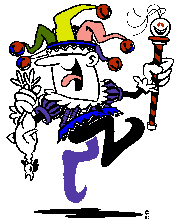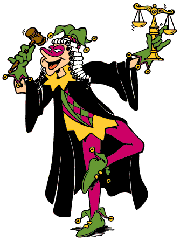
April Fool's Day
 Unlike most of the other non-foolish holidays, the history of April Fool's
Day, sometimes called All Fool's Day, is not totally clear. There really wasn't
a "first April Fool's Day" that can be pinpointed on the calendar.
Some believe it sort of evolved simultaneously in several cultures at the same
time, from celebrations involving the first day of spring.
Unlike most of the other non-foolish holidays, the history of April Fool's
Day, sometimes called All Fool's Day, is not totally clear. There really wasn't
a "first April Fool's Day" that can be pinpointed on the calendar.
Some believe it sort of evolved simultaneously in several cultures at the same
time, from celebrations involving the first day of spring.
The closest point in time that can be identified as the beginning of this tradition was in 1582, in France. Prior to that year, the new year was celebrated for eight days, beginning on March 25. The celebration culminated on April 1. With the reform of the calendar under Charles IX, the Gregorian Calendar was introduced, and New Year's Day was moved to January 1.
However, communications being what they were in the days when news traveled by foot, many people did not receive the news for several years. Others, the more obstinate crowd, refused to accept the new calendar and continued to celebrate the new year on April 1. These backward folk were labeled as "fools" by the general populace. They were subject to some ridicule, and were often sent on "fools errands" or were made the butt of other practical jokes.
This harassment evolved, over time, into a tradition of prank-playing on the first day of April. The tradition eventually spread to England and Scotland in the eighteenth century. It was later introduced to the American colonies of both the English and French. April Fool's Day thus developed into an international fun fest, so to speak, with different nationalities specializing in their own brand of humor at the expense of their friends and families.
In Scotland, for example, April Fool's Day is actually celebrated for two days. The second day is devoted to pranks involving the posterior region of the body. It is called Taily Day. The origin of the "kick me" sign can be traced to this observance.
Mexico's counterpart of April Fool's Day is actually observed on December 28. Originally, the day was a sad remembrance of the slaughter of the innocent children by King Herod. It eventually evolved into a lighter commemoration involving pranks and trickery.
Pranks performed on April Fool's Day range from the simple, (such as saying, "Your shoe's untied!), to the elaborate. Setting a roommate's alarm clock back an hour is a common gag. Whatever the prank, the trickster usually ends it by yelling to his victim, "April Fool!"
Practical jokes are a common practice on April Fool's Day. Sometimes, elaborate practical jokes are played on friends or relatives that last the entire day. The news media even gets involved. For instance, a British short film once shown on April Fool's Day was a fairly detailed documentary about "spaghetti farmers" and how they harvest their crop from the spaghetti trees.
April Fool's Day is a "for-fun-only" observance. Nobody is expected to buy gifts or to take their "significant other" out to eat in a fancy restaurant. Nobody gets off work or school. It's simply a fun little holiday, but a holiday on which one must remain forever vigilant, for he may be the next April Fool!
 In sixteenth-century France, the start of the new year was observed on
April first. It was celebrated in much the same way as it is today with
parties and dancing into the late hours of the night. Then in 1562, Pope
Gregory introduced a new calendar for the Christian world, and the new year
fell on January first. There were some people, however, who hadn't heard or
didn't believe the change in the date, so they continued to celebrate New
Year's Day on April first. Others played tricks on them and called them
"April fools." They sent them on a "fool's errand" or
tried to make them believe that something false was true. In France today,
April first is called "Poisson d'Avril." French children fool their
friends by taping a paper fish to their friends' backs. When the "young
fool" discovers this trick, the prankster yells "Poisson d’Avril!"
(April Fish!)
In sixteenth-century France, the start of the new year was observed on
April first. It was celebrated in much the same way as it is today with
parties and dancing into the late hours of the night. Then in 1562, Pope
Gregory introduced a new calendar for the Christian world, and the new year
fell on January first. There were some people, however, who hadn't heard or
didn't believe the change in the date, so they continued to celebrate New
Year's Day on April first. Others played tricks on them and called them
"April fools." They sent them on a "fool's errand" or
tried to make them believe that something false was true. In France today,
April first is called "Poisson d'Avril." French children fool their
friends by taping a paper fish to their friends' backs. When the "young
fool" discovers this trick, the prankster yells "Poisson d’Avril!"
(April Fish!)
Today Americans play small tricks on friends and strangers alike on the first of April. One common trick on April Fool's Day, or All Fool's Day, is pointing down to a friend's shoe and saying, "Your shoelace is untied." Teachers in the nineteenth century used to say to pupils, "Look! A flock of geese!" and point up. School children might tell a classmate that school has been canceled. Whatever the trick, if the innocent victim falls for the joke the prankster yells, "April Fool! "
The "fools' errands" we play on people are practical jokes. Putting salt in the sugar bowl for the next person is not a nice trick to play on a stranger. College students set their clocks an hour behind, so their roommates show up to the wrong class - or not at all. Some practical jokes are kept up the whole day before the victim realizes what day it is. Most April Fool jokes are in good fun and not meant to harm anyone. The most clever April Fool joke is the one where everyone laughs, especially the person upon whom the joke is played.